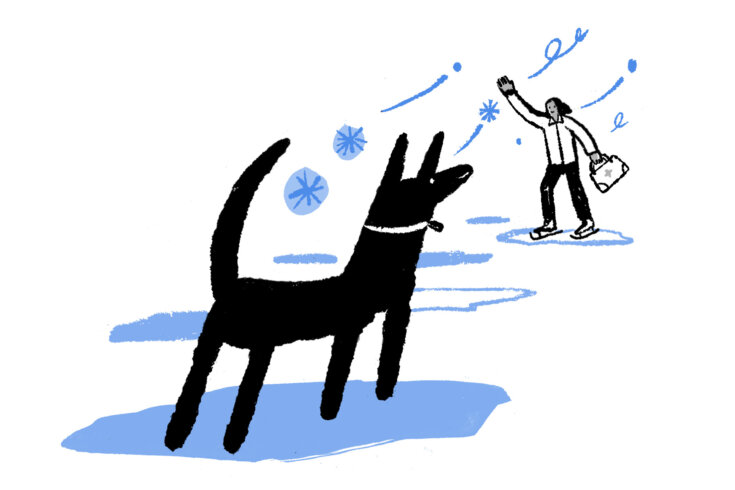
As a veterinarian in the Northwest Territories, I mainly see dogs but also cats, rabbits, guinea pigs, and birds. I once saw a turtle in Tuktoyaktuk. I remember the owner had brought her dog into a temporary clinic and asked us, “Do you guys see turtles too?” We said, “Of course.” She told us she’d go home and walk with her turtle back to us, but it was March or April—the ocean was still frozen—so we arranged a ride for her and her turtle. He was healthy, about three years old. We asked her what he ate, because produce is really expensive in the North. And she told us, “He eats lettuce, but he loves caribou.”
I run a mobile practice, making house calls in Yellowknife and the surrounding areas. I also do veterinary telemedicine consults for the Northwest Territories and Nunavut. Telemedicine for animals in the south has grown during the pandemic, but it’s long been essential to many remote communities in the North. It can be hard for animals to receive care if their owners need to pay thousands of dollars for a flight to Yellowknife. But telemedicine is definitely more challenging for me—and can be for the owner too, because they may have to act as my assistant. On a video chat, I might ask them to feel their pet’s belly or lift their lip so I can see their gum colour. Or if their dog got bit and I need to look at the wound, then I might teach them how to clean it up and send them antibiotics.
There are so many unique barriers here. To get a CT scan for your pet, you may need to fly to Edmonton. There are thirty-three communities in the Northwest Territories, twelve of which are only accessible by air for most of the year, so the cost of even getting food here is extreme. In the North, grocery prices are high already, but a bag of dog food that costs about $50 in major cities in the south can cost around $130 in some communities here. The dogs we often see are working dogs, who are very important, historically and traditionally, to Indigenous peoples. They can protect their owners from bears and other wildlife out on the land. But they may also be serving a companionship role. Pets are also good for mental health through the dark, cold winters.
I haven’t been seeing the same numbers of pet surrenders in the North as elsewhere, but the adoption pool here is very saturated. The SPCA shelter in Yellowknife relies on transferring pets south to be adopted, and we are seeing bottlenecks in those transfers because many of those shelters are full.
Recently, with more people working from home, many here have adopted animals as companions, and those who already had pets are spending a lot more time with them. That time together can deepen bonds and can also allow people to notice health issues in their pets sooner rather than later. That’s contributed to the increased need for services, and there are only two brick-and-mortar vet clinics in the entire Northwest Territories.
Many of the issues escalating in the south around access to vet care have long been present in the North, and it’s something we’ve had to navigate in creative ways. One thing I’ve been working on is increasing access to remote communities, and that includes telemedicine. One avenue that we’re exploring at Veterinarians Without Borders Canada is creating a program to train northern residents in animal care first aid, to act as what are known as para-vets. Then they can provide basic care to animals in their own communities.
In veterinary medicine, we’re trying to raise awareness of “One Health,” which is the idea that the health of animals, humans, and the environment is all connected. As we’re trying to increase access to care and awareness of vet medicine in the North, we’re focusing on that interconnectedness. Because if the dogs aren’t healthy, then the people might not be healthy, and that could mean the environment isn’t healthy either.
As told to Michelle Cyca.








